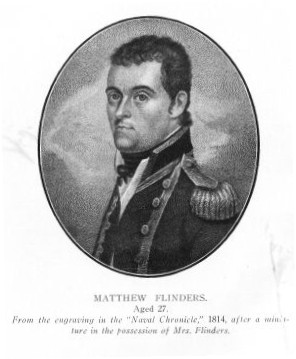THE LIFE OF CAPTAIN MATTHEW FLINDERS, R.N.
BY ERNEST SCOTT
PROFESSOR OF HISTORY IN THE UNIVERSITY OF MELBOURNE
AUTHOR OF "TERRE NAPOLEON" AND "LIFE OF LAPEROUSE"
WITH PORTRAITS, MAPS, AND FACSIMILES.
SYDNEY
ANGUS & ROBERTSON LTD.
89 CASTLEREAGH STREET
1914.
PREFACE.
The subject of this book died one hundred years ago. Withinhis forty years of life, he discovered a very large area of whatis now an important region of the earth; he participated instirring events which are memorable in modern history; he applieda vigorous and original mind to the advancement of knowledge,with useful results; and he was the victim of circumstanceswhich, however stated, were peculiarly unfortunate, and mustevoke the sympathy of everyone who takes the trouble tounderstand them. His career was crowded with adventures: war,perilous voyages, explorations of unknown coasts, encounters withsavages, shipwreck and imprisonment are the elements which go tomake up his story. He was, withal, a downright Englishman ofexceptionally high character, proud of his service and unsparingof himself in the pursuit of his duty.
Yet up to this time his biography has not been written. Thereare, it is true, outlines of his career in various works ofreference, notably that contributed by Sir J.K. Laughton to theDictionary of National Biography. But there is no book to which areader can turn for a fairly full account of his achievements,and an estimate of his personality. Of all discoverers of leadingrank Matthew Flinders is the only one about whom there is noample and convenient record.
This book endeavours to fill the gap.
The material upon which it is founded is set forth in thefootnotes and the bibliography. Here the author takes pleasure inacknowledging the assistance he has received from severalquarters. A previous book brought him the acquaintance of thegrand-nephew of that Comte de Fleurieu who largely inspired threefamous French voyages to Australia—those of Laperouse,Dentrecasteaux and Baudin—all of which have an important bearingupon the subject. The Comte A. de Fleurieu had long been engagedin collecting material relative to the work and influence of hisdistinguished grand-uncle, and in the most generous manner hehanded over to the author his very large collection ofmanuscripts and note-books to be read, noted, and used atdiscretion. Even when a historian does not actually quote ordirectly use matter bearing upon his subject, it is of immenseadvantage to have access to documents which throw light upon it,and which enable an in-and-out knowledge of a period and personsto be obtained. This book owes much of whatever value it maypossess to monsieur de Fleurieu's assistance in this respect, andthe author thanks him most warmly.
The Flinders papers, of which free use has been made, werepresented to the Melbourne Public Library by Professor W.M.Flinders Petrie. They are described in the bibliography. Thetranscripts of family and personal documents were especiallyvaluable. Although they were not supplied for this book,Professor Flinders Petrie gave them in order that they might beof use to some biographer of his grandfather, and the author begsto thank him, and also Mr. E La Touche Armstrong, the chieflibrarian, in whose custody they are, and who has given frequentaccess to them.
The rich stores of manuscripts in the Mitchell Library,Sydney, have been thoroughly examined, with the assistance of Mr.W.H. Ifould, principal librarian, Mr. Hugh Wright, a
